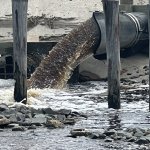TRENTON —The Conectiv Deepwater Generating Station in Salem County
faces $5.3 million in fines and the loss of a permit needed to operate its
primary generator as the result of its continued failure to address
excessive emissions of a hazardous air pollutant, according to a release from Department of Environmental Protection Commissioner Lisa P. Jackson Thursday, Sept. 18.
“We are imposing these stiff sanctions because this company has been
repeatedly recalcitrant when told to correct this problem,” Jackson stated. “Compliance is DEP’s first priority here and elsewhere.”
Between December 2007 and April 2008, Conectiv ignored DEP orders to resolve
problems with excessive emissions of hydrogen chloride from the boiler for
the primary generator at the power plant in Pennsville adjacent to
the Delaware Memorial Bridge.
The violations and penalties are detailed in an Administrative Order of
Revocation and Notice of Civil Penalty Assessment issued against Newark,
Del.-based Conectiv. The order specifically cites the company for exceeding
the rate of emissions allowed in its permit on 106 days during this period.
The company has taken no steps to correct the problem.
The DEP has ordered Conectiv to adhere to the hydrogen chloride limits in
its permit or face revocation of the operating permit for the boiler
effective Oct. 21. Operation of the unit after that date will result in
additional penalties. Conectiv must conduct additional stack tests for
hydrogen chloride within 45 days of receipt of the administrative order.
Coal is the primary fuel source for the boiler. When burned, coal releases
chloride that combines with hydrogen in the air. The hydrogen chloride that
results can mix with moisture in the air to form hydrochloric acid aerosol,
a respiratory irritant.
Installation of state-of-the-art pollution controls for acid gases would
resolve the hydrogen chloride problem. Conectiv has the right to request a
hearing before the Office of Administrative Law.
According to the utility’s Web site:
The Deep Water Power Plant is located on the Delaware River. The original plant construction began in 1929. The two remaining operating units were constructed in the 1950s.
Unit 6/8 was commissioned in 1954, and Unit 1 in 1959. The units are conventional steam boilers with superheat and reheat sections. Steam from the boilers drives independent turbine generators. The steam is generated in the boilers through the combustion of coal, natural gas and oil. The variability of fuel supports Conectiv Energy’s efforts to optimize operating and marketing conditions.








